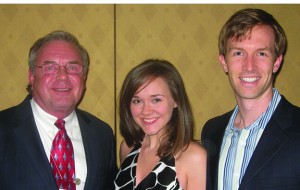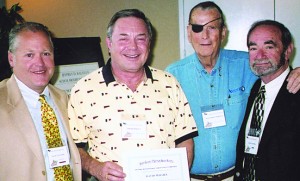May 2014, Vol. 69 No. 5
Features
NASSCO Standard Bearers

In 2016, NASSCO will celebrate its 40th year of setting standards for the assessment and rehabilitation of underground infrastructure.
As we look forward, we also look back to those who have made significant contributions and have impacted the continued acceptance and use of trenchless technologies. This is the first in a series of articles exploring the history of NASSCO through the eyes of industry leaders.
Prior to his passing in January, we had the honor of interviewing David Magill, founder of Avanti International. Here are his comments:
From 1970-1975, I was living in Baton Rouge, LA, and working for a consulting engineering firm that did work on sanitary sewers. We had a project in Hot Springs, AR, that required us to hire a municipal contractor to do CCTV work. We hired Naylor Industries, which was later acquired by Insituform.
In 1975 I finished my MBA and went on to work for the Naylor office in Houston where I was in charge of their municipal division. During that time the division grew from three people to about 80. The federal government helped fund our SSES program to determine if it was more economical to spend money on rehabilitation or accept groundwater.
Jim Witt was my boss at Naylor and he was very active in getting NASSCO started back in 1976 because he saw many inconsistencies at the federal vs. local level when it came to bidding work. For example, workers on a federally-funded project would be paid the “prevailing wage” but no one really knew what that meant. Was it the prevailing wage in Washington, D.C., Kansas or somewhere else? Jim saw the need for standardization, especially as it pertained to job descriptions, wages paid and making sure everyone operated under the same rules.
Jim joined other industry professionals and NASSCO was formed to meet the growing need for standards including how work was conducted, how specs were written and how people were paid. Back then, if a contractor did work, the city really didn’t know what work was done. Contractors had fancy equipment but the owner had no clue what was happening or how to evaluate if the job was done right. The inspector didn’t ask questions – it was a black box. This has been a problem in this industry throughout the years.
NASSCO started as a contractor organization; others were associate members. Associates were not voting members so while I could attend meetings, I couldn’t vote or hold office. Associate members were more or less resigned to accept whatever contractors decided. Eventually more associates came to NASSCO meetings than contractors, so NASSCO added associate members to the Board. At that point, Bill O’Donnell with Avanti served, I believe, a three-year term on the board and then I served a three year term on the board after that.
David Magill (left) with son Daniel and his wife, Melissa.

At Avanti, we want to set standards because we believe we sell the best product. Anyone who has a good product wants it to be measured against good standards because it will shine. We started Avanti in 1978 and I wanted to show up at my first NASSCO meeting with a keg of acrylamide chemical grout! I wanted to demonstrate the safety and quality of acrylamide which is low viscosity – it can go anywhere water goes. But because it goes into the soil to seal the joint, acrylamide has great potential. It is weak enough to allow the packer to be released from the joint after the grout cures, but it is strong enough to stop the leaks. It possesses a delicate balance between strength and weakness and works beautifully with existing equipment.
But there were problems with the perception of the grout. In 1978 in Lake Tahoe, I tried to ship a drum of the grout and airport employees wouldn’t handle it. Eventually, the EPA tried to get rid of acrylamide.
CUES decided to stop selling the grout and that left Avanti as the only acrylamide supplier, but also the only ones to fight the EPA. In 1990, EPA decided to put us out of business, so we polled our long-term industry customers and they really did not want to lose acrylamide.
We brought it up to the NASSCO level, asking for their help in identifying the desire of contractors to hold onto acrylamide grout. We got an overwhelmingly positive response and NASSCO took the next step, hiring attorneys to fight the EPA. Avanti contributed money, but so did a lot of other companies such as Aries, Telespector and CUES, as well as contractors and cities. There was a strong, united effort on the part of NASSCO and all members came together to successfully save acrylamide.
Over the years NASSCO has grown in a very satisfying way. For a long time, they were a closed society, not attracting engineers or rehabilitation processes that were oriented for something other than sanitary sewers. But that has changed dramatically over the years. NASSCO is now bigger and more diverse with really smart people.
In my opinion, NASSCO has grown mostly because of PACP [Pipeline Assessment Certification Program] which has allowed the organization to bring in more money, hire great people and give NASSCO a central focus. Most importantly, PACP has influenced the collection, documentation and reporting protocol for pipeline assessment data and has set solid standards.
I believe inspection of pipes is an area where NASSCO has room to grow and improve. Back in the day, inspectors were easily distracted or didn’t even know what their job was. This made it difficult to prove what had been done. It’s easier to prove a job is done well while it is being done. We need more inspectors with integrity who are knowledgeable about what they expect in a job. At the end of the day, the goal is to have a better sewer system and a big part of that goal is to have an inspector who stays on the job until it is done.
David Magill is inducted in NASSCO’s Select Society of Sanitary Sewer Sleuths.

My greatest hope for the future of NASSCO is that it will not only continue to set standards – but also report information and findings back to the industry as a whole. If a company is going to sell products to this industry or rehabilitate pipes, they must know the standards they must meet.
Let’s do what’s right for our industry.




Comments